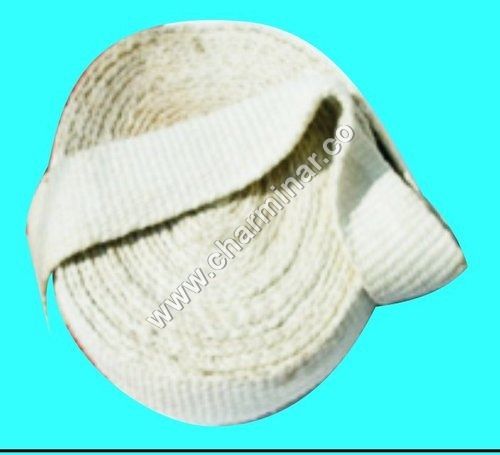Talk to us
08045801942
We are successfully ranked amongst the top-notch manufacturers and exporters of a wide range of Ceramic Tapes. Offered tapes are manufactured by our experienced professionals using premium quality ceramic material and pioneering technology. It is available in different finish and lengths as per the requirements of clients. Provided tapes are widely used for wrapping of hot pipes, heat and thermal insulation in steel plants and heat conductivity and are highly demanded in various industries. Clients can avail these Ceramic Tapes from us at reasonable prices.
Features:
Heat resistance
High durability
Eco Friendliness
Perfect finish
Specifications:
ITEM: Ceramic tapes
Temperature Resistance: 1260 degree C
Sizes : WIDTH: 25MM/100MM
Thickness: 3MM to 6MM
STD PKG: 10 KG ROLL
FAQs:
Q: What are ceramic tapes?
A: Ceramic tapes are thin, flexible sheets of material that are made from ceramic materials such as alumina or zirconia. They are commonly used in high temperature applications, such as electrical insulation, due to their ability to withstand extreme temperatures.
Q: What are the benefits of using ceramic tapes?
A: Ceramic tapes offer a number of benefits, including high temperature resistance, high electrical insulation resistance, and low dielectric loss. They are also durable, flexible, and lightweight, making them easy to handle and install.
Q: What industries use ceramic tapes?
A: Ceramic tapes are used in a variety of industries, including electrical, aerospace, automotive, and medical. They are commonly used for applications such as electrical insulation, high temperature wire wrapping, and heat shielding.
Q: What is the temperature range of ceramic tapes?
A: Ceramic tapes can withstand temperatures ranging from -55 degree C to 1500 degree C, depending on the specific type of ceramic material used.
Q: How are ceramic tapes manufactured?
A: Ceramic tapes are typically manufactured through a process called slitting, which involves cutting the ceramic material into thin, flexible strips. The strips are then rolled into spools and coated with an adhesive to make the tape.


Price:
Price Range 375.00 - 425.00 INR / Kilograms
Minimum Order Quantity : 100 Kilograms
Product Type : Others
Ceramic Type : Other
Material : Zirconia Ceramic
Price Range 375.00 - 425.00 INR / Kilograms
Minimum Order Quantity : 100 Kilograms
Product Type : Others, Ceramic Rope
Ceramic Type : Other, Rope / Braided
Material : Other, Ceramic Fiber
Price Range 375.00 - 450.00 INR / Kilograms
Minimum Order Quantity : 100 Kilograms, ,
Product Type : Others, Yarn
Ceramic Type : Other, Refractory Ceramic
Material : Other, Ceramic Fiber